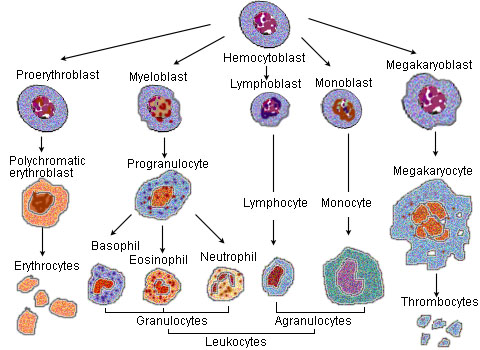Agranulocyte
(Redirected from Mononuclear cell)
Agranulocytes are a category of white blood cells that lack visible granules in their cytoplasm. The primary types of agranulocytes are monocytes and lymphocytes.

Definition[edit | edit source]
The term agranulocyte is derived from the prefix "a-" meaning "without" and the word "granule". Thus, agranulocytes are white blood cells without distinguishable granules in their cytoplasm when observed under a microscope. This differentiates them from granulocytes, which possess such granules.
Types[edit | edit source]
Agranulocytes can be primarily classified into two types:
- Monocytes: These cells are the largest type of white blood cell and play a vital role in fighting off certain types of infections, especially those caused by bacteria. They are also responsible for removing dead or damaged cells and helping with the immune response.
- Lymphocytes: Lymphocytes are critical for the body's immune response. They are responsible for producing antibodies and can directly attack cells or help control the immune response. They can be further sub-divided into T-cells and B-cells based on their functions.
Functions[edit | edit source]
Agranulocytes have a range of functions that contribute to the body's immune system:
- Response to Pathogens: Agranulocytes are essential for identifying and targeting various pathogens, including viruses, bacteria, and other harmful agents.
- Cellular Clean-up: Particularly monocytes can differentiate into macrophages which engulf and digest cellular debris and pathogens.
- Immunity Memory: Lymphocytes play a significant role in the adaptive immune system by remembering specific pathogens, ensuring faster and more efficient responses during future encounters.
Importance in Health and Disease[edit | edit source]
A balanced number of agranulocytes is essential for maintaining health and ensuring the effective functioning of the immune system. An abnormal count can indicate various conditions:
- An increase in lymphocytes might be seen in viral infections, certain types of leukemia, or lymphoma.
- A decrease in lymphocytes might indicate conditions like HIV/AIDS, severe malnutrition, or the effect of certain medications.
See Also[edit | edit source]
| This article is a medical stub. You can help WikiMD by expanding it! | |
|---|---|
| Myeloid blood cells and plasma | ||||||
|---|---|---|---|---|---|---|
|
Search WikiMD
Ad.Tired of being Overweight? Try W8MD's physician weight loss program.
Semaglutide (Ozempic / Wegovy and Tirzepatide (Mounjaro / Zepbound) available.
Advertise on WikiMD
|
WikiMD's Wellness Encyclopedia |
| Let Food Be Thy Medicine Medicine Thy Food - Hippocrates |
Translate this page: - East Asian
中文,
日本,
한국어,
South Asian
हिन्दी,
தமிழ்,
తెలుగు,
Urdu,
ಕನ್ನಡ,
Southeast Asian
Indonesian,
Vietnamese,
Thai,
မြန်မာဘာသာ,
বাংলা
European
español,
Deutsch,
français,
Greek,
português do Brasil,
polski,
română,
русский,
Nederlands,
norsk,
svenska,
suomi,
Italian
Middle Eastern & African
عربى,
Turkish,
Persian,
Hebrew,
Afrikaans,
isiZulu,
Kiswahili,
Other
Bulgarian,
Hungarian,
Czech,
Swedish,
മലയാളം,
मराठी,
ਪੰਜਾਬੀ,
ગુજરાતી,
Portuguese,
Ukrainian
Medical Disclaimer: WikiMD is not a substitute for professional medical advice. The information on WikiMD is provided as an information resource only, may be incorrect, outdated or misleading, and is not to be used or relied on for any diagnostic or treatment purposes. Please consult your health care provider before making any healthcare decisions or for guidance about a specific medical condition. WikiMD expressly disclaims responsibility, and shall have no liability, for any damages, loss, injury, or liability whatsoever suffered as a result of your reliance on the information contained in this site. By visiting this site you agree to the foregoing terms and conditions, which may from time to time be changed or supplemented by WikiMD. If you do not agree to the foregoing terms and conditions, you should not enter or use this site. See full disclaimer.
Credits:Most images are courtesy of Wikimedia commons, and templates, categories Wikipedia, licensed under CC BY SA or similar.
Contributors: Prab R. Tumpati, MD

